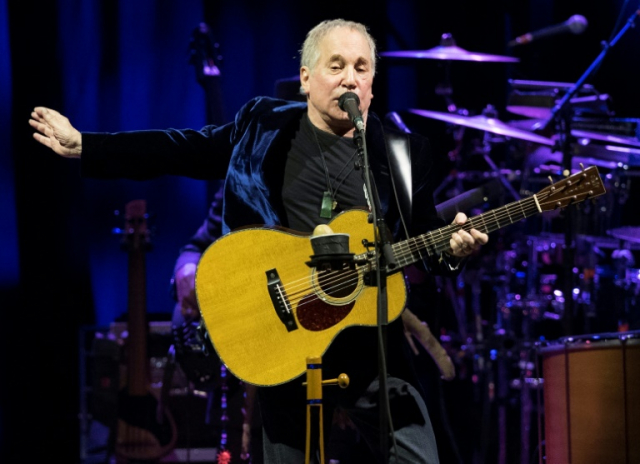
US singer Paul Simon, seen here performing at the Bilbao Exhibition Centre in the Spanish city of Barakaldo in 2016, will hold his farewell show on July 15 in London’s Hyde Park © ANDER GILLENEA – AFP/File
Folk rock legend Paul Simon announced Monday what he said would be his final tour, saying he had grown tired of traveling after 50 years as a performer.
The 76-year-old, who went from a conscience of the 1960s generation to a pioneer of world music fusion, will open the farewell tour of North America and Europe on May 16 in Vancouver.
Simon, a native New Yorker whose career first took off in Britain, will say goodbye on July 15 in London’s Hyde Park, where he played a career-spanning concert in 2012 that he turned into a live album.
Simon said he had been thinking more seriously about retirement after the death of his backup band’s longtime guitarist, Vincent N’guini, in December.
“Mostly, though, I feel the travel and time away from my wife and family takes a toll that detracts from the joy of playing,” said Simon, who is married to fellow folk singer Edie Brickell, his third wife, with whom he has three children.
“I’d like to leave with a big Thank You to the many folks around the world who’ve come out to watch me play over the last 50 years,” he said in a written message to fans.
Simon said he was still open to performing after his farewell tour but only occasional concerts to support causes dear to him, such as the environment.
Decades of experimentation
Simon, originally in a duo with Art Garfunkel, became one of the voices of the 1960s generation with his musically peaceful yet politically engaged songwriting.
Simon and Garfunkel released a string of classic hits, including “Bridge over Troubled Water” and “Mrs. Robinson.”
Later, as a solo artist, he helped shape the course of world music with “Graceland,” the 1986 album often regarded as his masterpiece.
“Graceland” took Simon to apartheid-era South Africa after he became fascinated by hearing a tape of “Township Jive” dance music, which he blended with zydeco rhythms from Louisiana and his own personal pop songwriting.
The album won the Grammy for Album of the Year and made stars out of choral group Ladysmith Black Mambazo, whose rich voices provided the harmonies.
Simon has not given up on experimentation. His last album, 2016’s “Stranger to Stranger,” incorporated the unique instruments of 20th century musicologist Harry Partch, who designed microtonal scales — meaning smaller intervals than those usually used in Western music.
Simon openly mulled retirement in 2016 before playing two shows at the Forest Hills stadium, near the area where he grew up in the New York borough of Queens.
“Showbiz doesn’t hold any interest for me,” Simon told The New York Times at the time, adding: “It’s an act of courage to let go.”
But he returned soon afterward, singing at the Democratic National Convention that nominated Hillary Clinton, touring Europe and later playing across the United States as part of an effort to promote education and research on preserving the biodiversity of life on Earth.
New York is noticeably absent among the announced dates on the farewell tour, which includes two dates at the Hollywood Bowl in Los Angeles. MKH
RELATED STORIES: